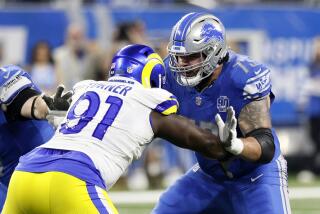After zigzag path to NFL, Fred Jackson has top billing in Buffalo
PITTSFORD, N.Y. — Fred Jackson’s path to the NFL was much like one of his long, serpentine touchdown runs, the ones where he zigzags across the field and beats defenders not with blistering speed but an uncanny feel for changing directions at precisely the right time.
That Jackson made it to the Buffalo Bills — and became one of the better running backs in the league — is an inspiring testament to his determination, because a lot of other players would have long since given up.
His career didn’t route him through Los Angeles, Ann Arbor, Columbus, Baton Rouge or any other big-time college football hub. Jackson went to Coe College — a Division III school in Cedar Rapids, Iowa — wasn’t invited to the scouting combine and barely got a sniff from anyone in the NFL. He’s now a centerpiece of the Bills, who open the regular season Sunday at the New York Jets.
Jackson, 31, recalls talking to a Green Bay scout after college who essentially gave him the Heisman stiff-arm.
“He told me, ‘I think you’re talented, but you’re not good enough to play in the NFL,’” said Jackson, who in 2011 was the league’s third-leading rusher with 934 yards when he suffered a season-ending broken leg in Week 11. “I was highly motivated after hearing that.”
He needed that motivation to carry him through his days playing in an alphabet soup of indoor football leagues, then NFL Europa, before finally getting a break with the Bills — courtesy of fellow Coe graduate Marv Levy, the Hall of Fame Bills coach.
It’s no wonder Jackson is so refreshingly appreciative of where he is now, even though he speaks fondly of those two seasons he spent playing for the Sioux City Bandits of the National Indoor Football League (then United Indoor Football).
In those years, 2004-05, Jackson and his wife, Danielle, were scraping by mostly on her salary as a day-care worker and his as a youth counselor. The team provided them with a hotel room and food vouchers during the season, and Jackson was paid $200 per game — $225 if the Bandits won.
“When I first started, after two or three days there, I almost quit,” Jackson recalled. “I was like, ‘There’s no way I’m going to get noticed at this level. There’s no way to get to the NFL from here.’ So I talked to my wife and she said, ‘You’ve got to play somewhere. Just stick with it.’ And I did.”
Over lunch in the Bills’ cafeteria at training camp last month, Jackson laughed about those days playing indoor football. He has fond memories, and he made a lot of friends along the way, but there were some comically lean times.
There was the time he and his teammates spent 18 hours on a bus for a game in Wyoming. The Bandits had signed a kicker the day before the trip, and he thought the bus was for a ride to the airport. When the kicker found out the entire journey would be on the bus, he promptly quit.
Then there was the process of being fitted for equipment. That consisted of players digging through separate piles of helmets and shoulder pads to find what felt right — a far cry from the way the NFL pampers its players.
“You’d have guys, other players, coming up to you with helmets and shoulder pads on, saying, ‘Does this look right?’” Jackson said, chuckling. “It was pretty rinky-dink.”
Even as the team’s star and UIF’s co-most valuable player in 2005, Jackson knew he was unlikely to get the attention of NFL scouts. He was overlooked coming out of high school in Texas because of his size — he was far smaller than his current 6 feet 1, 215 pounds — and ignored coming out of Division III college. In those indoor leagues, he might as well have been invisible.
Enter Levy. Four decades before he coached the Bills to four consecutive Super Bowl appearances, Levy was head coach at Coe. His best player was Wayne Phillips, who also would go on to become a longtime head coach at the school.
Phillips retired to Arlington, Texas, where he coached twin brothers Fred and Patrick Jackson in middle school. He helped steer the small but talented twins to Coe because they wanted to play college ball together.
It was Phillips who called Levy about Fred Jackson, raving about the pro potential of the Kohawks’ standout, who was a two-time Iowa Intercollegiate Athletic Conference MVP.
Levy eventually met Jackson. The legendary coach, who was retired at the time, promised that if he were ever in a position of authority again with an NFL team, he’d give Jackson a tryout. Sure enough, a week after he was named general manager of the Bills in 2006, Levy called the running back and invited him to work out with the team.
Although they were impressed with what they saw, the Bills weren’t ready to give Jackson a roster spot. They signed him to their practice squad, then sent him to NFL Europa, where he led the Rhein Fire in rushing.
There was no indication the Bills had big plans for Jackson. Despite his performance overseas, the Bills ignored other needs and used the 12th pick on running back Marshawn Lynch in 2007. Two years later, Jackson would supplant him as starter and notch his first 1,000-yard season. The Bills continued to scan the horizon for a running back, however, selecting C.J. Spiller with the ninth pick in 2010. Once again, Jackson endured by winning the starting job.
“Fred just had to stay in the shadows, but he finally emerged,” said Levy, who retired as GM after the 2007 season. “Beyond being a great player, he was the guy I always wanted with the Buffalo Bills.”
Other esteemed coaches can understand why. In an interview with the Buffalo News, longtime NFL coach Bill Parcells called Jackson a “tremendous” player.
“The reason I say that is this guy can do everything,” Parcells said. “He can run and he can block and he can catch. There aren’t many of those guys left. That guy’s a football player. The Bills are lucky to have him.”
Considering where he’s been, though, Jackson takes nothing for granted.
“My goal is to be here and to play,” he said. “So you’re going to have to peel me off this field, because I’m not giving up my spot. These guys laid their neck on the line for me, bringing me in here, so I want to make it worth it for them.”
More to Read
Go beyond the scoreboard
Get the latest on L.A.'s teams in the daily Sports Report newsletter.
You may occasionally receive promotional content from the Los Angeles Times.











